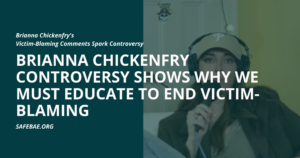Brianna Chickenfry Controversy Shows Why We Must Educate to End Victim-Blaming
Brianna Chickenfry’s Victim-Blaming Comments Spark Controversy
The Brianna Chickenfry Controversy: A Spotlight on Victim-Blaming Among Friends
Recently, popular social media personality and Barstool Sports figure Brianna Chickenfry found herself at the center of a controversy that sparked intense backlash. The controversy surrounding Brianna Chickenfry erupted after she made troubling remarks that many interpreted as victim-blaming her friend following a serious incident of sexual assault. In a video that quickly gained traction on social media, Brianna implied that her friend bore some responsibility for what happened, suggesting she could have “handled things differently.” These comments ignited a firestorm, with people accusing Brianna of completely missing the mark when it comes to supporting survivors of sexual violence.
Brianna’s words implied that younger girls should avoid hanging out with older men to avoid being taken advantage of. Her statements about avoiding older men at bars and hanging out with people your age carried the implication that her friend could have been safer if she made different choices, which led to the perception of victim-blaming.
Her words not only perpetuated harmful narratives about survivors being responsible for the assault they experience, but they also sparked outrage for their sheer lack of empathy. In a world where survivors often struggle with self-blame, hearing a friend publicly echo those same damaging sentiments is particularly devastating.
The situation worsened during the video when Brianna’s co-host, visibly uncomfortable and emotionally rattled, suddenly blurted out, “It wasn’t my fault,” a raw and heart-wrenching moment that underscored the gravity of the conversation. Rather than pausing to acknowledge the deep pain and vulnerability exposed in that moment, Brianna pressed on, defending her original remarks and attempting to justify her stance. This only made matters worse showcasing how easily conversations about sexual assault can derail when the focus is shifted from the real issue: accountability for perpetrators.
Brianna’s handling of the situation has left a bad taste in many people’s mouths, especially in a culture where victim-blaming is still rampant and survivors are often left to navigate their trauma in silence. The backlash wasn’t just about a misguided comment—it was about the failure to recognize the power and responsibility public figures hold when discussing such sensitive, life-altering topics.
The Harmful Impact of Victim-Blaming and the Responsibility of Public Figures
Victim-blaming is one of the most damaging responses a survivor of sexual assault can face, yet it remains alarmingly common in public discourse. Comments like those made by Brianna Chickenfry, which implied her friend was partly responsible for her own assault, undermine survivors’ experiences and perpetuate a dangerous narrative that shifts responsibility away from the perpetrator. When public figures with significant influence engage in victim-blaming, it reinforces the idea that survivors are somehow complicit in their own abuse, which can have devastating effects.
It’s important to acknowledge that Brianna’s intentions were likely good—her advice about not meeting up with older men, in theory, might be meant to protect her audience. However, the timing and delivery of that message were inappropriate. During a conversation about sexual assault, placing emphasis on the actions of the victim, rather than unequivocally condemning the perpetrator, sends the wrong message. Regardless of the advice given, full responsibility always lies with the perpetrator. Comments like Brianna’s inadvertently shift the focus away from holding the abuser accountable, which is where it needs to stay.
The ripple effect of such statements is profound. Survivors who hear these kinds of remarks may become less likely to come forward, fearing that they, too, will be blamed for the violence they endured. This contributes to the culture of silence surrounding sexual assault, where victims are made to feel ashamed or responsible for the trauma they’ve experienced. Moreover, it discourages others from offering support to survivors, as they might question whether the victim could have “done something differently” to prevent the assault.
Influencers and public figures, especially those with large followings, play a crucial role in shaping conversations around important issues. Their words carry immense weight, particularly among younger audiences who look to them as role models. When they fail to approach these topics thoughtfully, they risk contributing to harmful narratives that perpetuate victim-blaming and silence survivors.
Instead of using her platform to offer support or raise awareness about the realities of sexual violence, Brianna’s comments inadvertently downplayed the severity of her friend’s experience and sent a message to her followers that victim-blaming is acceptable. This not only harmed those directly involved but also set a dangerous precedent for how similar situations are discussed in the public sphere.
To create meaningful change, influencers must recognize that their words have power and that discussing issues like sexual violence requires care, empathy, and education. It’s no longer enough to simply “speak your mind”; influencers need to educate themselves on complex topics and understand the potential harm careless statements can inflict, particularly when discussing trauma and assault. Public figures have the opportunity to foster supportive, understanding conversations that center on survivor support, accountability, and prevention.
Through education and awareness, influencers and public figures can help shift the narrative away from victim-blaming and toward one that promotes justice and healing for survivors. Only by taking this responsibility seriously can they contribute to a culture where survivors feel safe, heard, and believed.
Moving Forward: Shifting the Narrative and Supporting Survivors
Youth are exposed to these harmful narratives through social media every day, which is why education is more important than ever. At SafeBAE, we’ve always emphasized the importance of centering survivors’ voices and creating environments where they feel supported, rather than judged or blamed.
As we work to combat victim-blaming and foster safer spaces, we encourage public figures, influencers, and all individuals to recognize the weight their words carry and the impact they can have on those around them. SafeBAE’s peer-led programming is designed to educate young people on the realities of sexual violence, helping them recognize harmful narratives and giving them the tools to become advocates for survivors. Through our workshops, training, and outreach efforts, we aim to dismantle the culture of silence and victim-blaming that often surrounds cases of sexual violence.
Our work at SafeBAE is about more than just education—it’s about empowerment. We believe that by equipping young people with the knowledge and tools to challenge these damaging narratives, they can become change-makers in their communities. Whether it’s teaching students about consent, training peer educators, or providing resources for survivors, SafeBAE is committed to shifting the conversation toward one of compassion, accountability, and justice.
We invite schools, youth clubs, and communities to bring SafeBAE’s free programming to their students, helping to create a future where survivors are supported and believed. By working together, we can continue to break the cycle of abuse, victim-blaming, and silence, and move toward a society where all young people can thrive in safe, respectful relationships.
If you’re interested in bringing SafeBAE’s programming to your community or learning more about how we support survivors and prevent sexual violence, please reach out to us at shael@safebae.org. Together, we can create lasting change and ensure that the voices of survivors are always heard.


